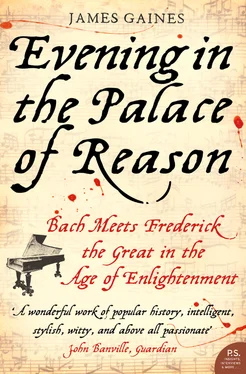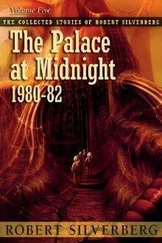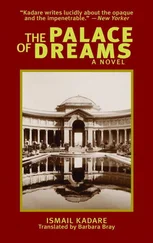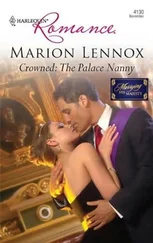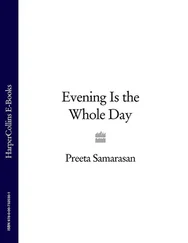1 ...7 8 9 11 12 13 ...18 Every day of Sebastian’s childhood was filled with music. His father, as director of town music and the town band, was chief dispenser of all the instrumental music in town, and his house was as busy with it as a conservatory’s practice rooms. Every morning at ten and afternoon at five, looking over the marketplace from the balcony of the town hall, Ambrosius Bach’s band played dances and folk tunes and the chorales that Luther and Lutheranism had made the most cherished of popular songs. The ensemble for such “tower pieces” included violin, viola da gamba, and other strings, brass, flutes, oboes and other reeds, and various percussion instruments. The town band numbered only five, but each member was trained on several instruments, and there were the apprentices and journeymen to call on.
Ambrosius also played regularly at St. George’s and in the duke’s court Kapelle, as did his older cousin Christoph, organist for the court as well as for the city’s three main churches. Sebastian’s “uncle” Christoph appears to have been a bit of a crank. He complained chronically of being short of funds and badly kept (he was finally given a home and stable at the Prince’s Mint, a rather grand establishment for an organist), but despite having more than sufficient skill and reputation to better himself, he complained about the same job for sixty years. Having a family member under his watch whom he could not quite control would have been an embarrassment for Ambrosius, and in fact, whether for this reason or another, the two men did not get along. But for Sebastian, having Uncle Christoph around was very good luck. Ambrosius gave the boy his first instruction on stringed instruments, but it was Uncle Christoph who would have given him his first inside view of the bellows, action, and pipes of the church organ, which with the possible exception of the clock was the most complicated mechanism of the seventeenth century. Perhaps the family’s greatest musician before Sebastian and the only person writing serious new music in Eisenach, a musician even more accomplished than Ambrosius, Christoph was also the boy’s first model as a composer. One of Sebastian’s favorite works by Christoph was an elaborate piece for choir and orchestra in which the archangel Michael and his celestial host take on Satan in the form of a dragon along with his cohort of dark angels, a story taken from Revelations 12:7–12:
And there was war in heaven: Michael and his angels fought against the dragon; and the dragon fought and his angels … The great dragon was cast out, that old serpent, called the Devil, and Satan, which deceiveth the whole world: he was cast out into the earth, and his angels were cast out with him.
Scored for two choirs, eight stringed instruments, organ, trumpets, and timpani, it must have been a sensation in its first performance on St. Michael’s Day, but we do not know whether young Sebastian was struck more by the beauty of the work or by the thrilling story of an archangel fighting a fire-breathing monster.
Childhood then being an unprivileged state, in which children were considered simply small, unready adults, Ambrosius would have pressed Sebastian into service as soon as he was able, just as he had pressed all his sons into such menial tasks as cleaning brass and stringing violins. Sebastian’s boyhood was anything but carefree. Infractions were severely punished, at home and at St. George’s School, where the eighty-one children in Sebastian’s quinta [1] class were packed into one small room whose high Gothic windows were filled not with sunlight and sky but the gray stone walls of the church. The school day ran in two sessions, mornings from seven to ten and afternoons from one to three, which left time for midday and late-afternoon work at home. The only vacation they had during the twelve-month school year was at harvesttime, which was no vacation. Choristers like Sebastian had longer hours than others to accommodate music classes and rehearsals; they had performances every Sunday and feast day and at weddings and funerals. A few times a year Sebastian would also join some of his fellow choristers to sing in the streets of Eisenach and nearby villages for small donations, called Chorgeld, a source of income for Sebastian throughout his school years.
Martin Luther had done the same thing early in the previous century, an experience that helped to seal his love of music and its place in the Lutheran liturgy. Music had had a somewhat ambiguous history in the church before the Reformation; some of the early church fathers, even Saint Augustine, were suspicious of its emotional power, but Luther put an end to that too.
You will find that from the beginning of the world [music] has been instilled and implanted in all creatures, individually and collectively. For nothing is without sound or harmony … Music is a gift and largesse of God, not a human gift. Praise through word and music is a sermon in sound.
Sebastian had Luther to thank that his youth had at least the light of music in it.

ALL OTHER LIGHT was shut off abruptly in his ninth year. In the spring, his mother died. In the fall, his father, having quickly remarried, died as well, leaving his second wife a widow and Sebastian, suddenly, an orphan. Though more common in those days, losing both parents was just as disorienting as it has ever been. Like all newly orphaned children, Sebastian would have felt abandoned, hurt, angry; and if he had had any wish to stay in Eisenach with Uncle Christoph or his new stepmother, it was not fulfilled. He was sent to Ohrdruf, a nearby town, to live with a brother he barely knew.
This brother, also named Christoph, the oldest child of Sebastian’s parents, had left home when Sebastian was an infant to apprentice himself to the composer and family friend Johann Pachelbel. Now he was the organist in Ohrdruf, a town much smaller than Eisenach but, in spiritual terms at least, a great deal more intense. While Eisenach was orthodox Lutheran to the core, Ohrdruf was riven, a center of the fierce rivalry between orthodoxy and a more ascetic, devotional form of Protestantism known as Pietism. Over the past century and a half of the Reformation, orthodox Lutheranism had gradually allowed itself to be ground into doctrinal minutiae by constant intersectarian brawling. Lutheran pastors were reduced to giving long-winded sermons on petty theological issues useful mainly for showing how important it was not to be Calvinist or Anabaptist. Pietism, drawing inspiration from such Christian mystics as Thomas à Kempis, Johannes Tauler, and Bernard of Clairvaux, set out to reclaim some of the spiritual energy of the early Reformation by stressing the inner, spiritual life, the daily struggle for meaning, and in doing so they drew sympathizers from all Protestant sects. The Calvinist king of Prussia, Frederick William I, father of Frederick the Great, was one. His Lutheran contemporary Sebastian Bach was another. Though he remained in the camp of the orthodox Lutheran church all his life, Sebastian’s sense of vocation as a church musician was rooted in the mystic spirituality of Pietism, an influence that took hold of him here, in Ohrdruf, and in the deepest grief of his childhood.
His commitment to religious studies at the Ohrdruf Lyceum, where the Pietist-orthodox struggle was played out every day, is plain to see in his class standing. When he left Eisenach he was twenty-third in his class at St. George’s (he had missed weeks of school during his parents’ illnesses, so he did well to keep his standing that high). Despite Ohrdruf’s more rigorous standards, he finished his first year of tertia in fourth place, and the next year, at age twelve the youngest in his class, he finished first.
Читать дальше
